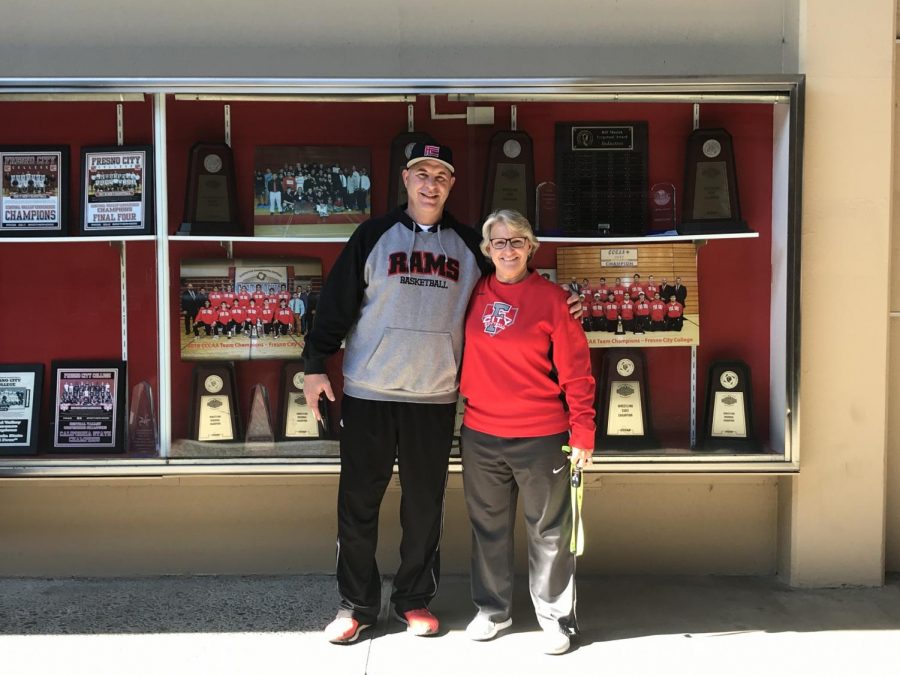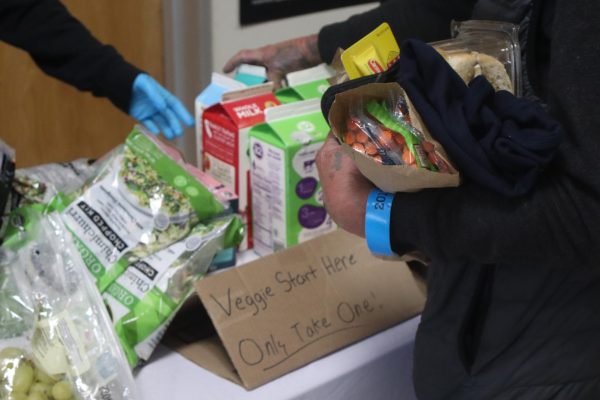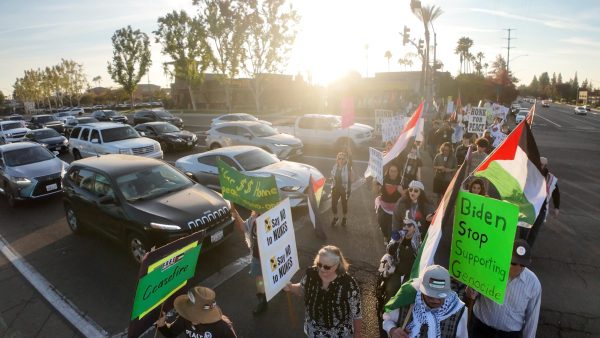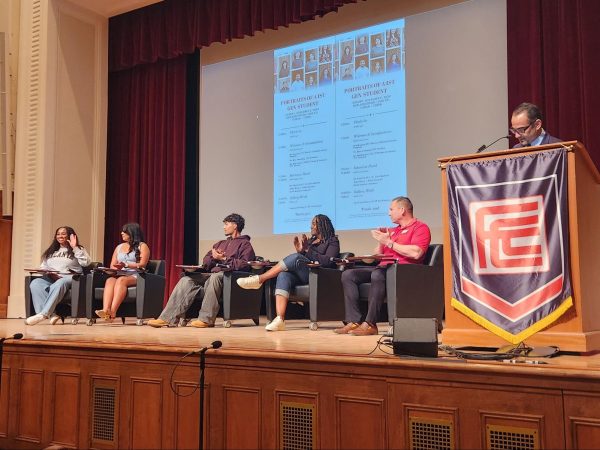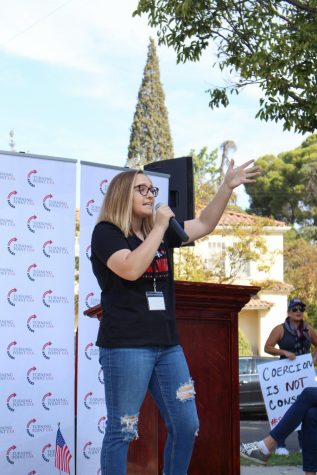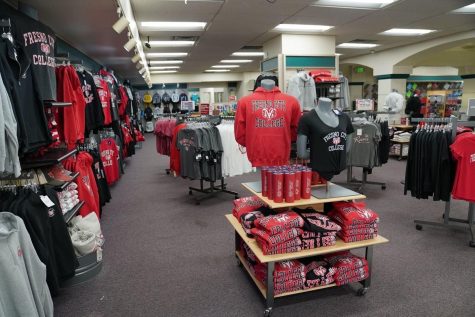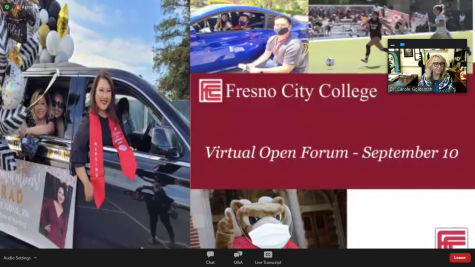Coping With COVID-19: Getting the Ball Rolling Again
Photo by: Ben Hensley
Co-athletic directors Paul Keysaw and Rhonda Williams, Monday Feb 10
Rhonda Williams was dropping off programs for a baseball game between the Fresno City College Rams and the Porterville College Pirates when her phone started buzzing with calls.
“Everyone was asking me ‘Are you playing your game?’ I’m like ‘Yeah we’re playing our game. Why wouldn’t we be?’” said Williams, the interim co-athletic director at FCC.
Willaims and FCC baseball head coach Ron Scott started getting numerous calls and messages asking if their March 12 baseball game had been canceled yet.
“Then I was with Dean Lorraine Smith – I went over to her office – and she was getting messages, I was getting messages, Coach [Scott] was getting messages. It was just- it was crazy,” she said.
The game would be canceled, and the Rams wouldn’t play another for the rest of the season. On March 19, the California Community College Athletic Association (CCCAA) Board of Directors announced that it would be canceling the 2020 spring sports season altogether due to concerns of COVID-19.
The CCCAA also announced that it would be restoring the spring season of competition for approximately 9,500 student-athletes. This means that none of FCC’s spring sports athletes, excluding those that played basketball in the 2019-2020 season, will be charged a season of eligibility.
“So that means then that any returning players – any of the sophomores that want to return and stay at Fresno City another year – they have that option of doing that,” said Williams.
This also permits athletes who’ve already committed to four-year universities to play at those universities for an extra year, allowing them to play three years as opposed to two. Players who weren’t satisfied with their spring 2020 season are also getting another chance to showcase their skills.
“I would think that maybe for some of them [athletes] who didn’t have scholarship opportunities to go and continue playing, another year playing at our level would give them those opportunities,” said Williams.
Athletes coming to FCC as freshmen from high school will not be granted an extra year of eligibility, but they face a different challenge. The CCCAA prohibited face-to-face recruiting and recruiting-related travel until further notice.
Women’s soccer head coach Oliver Germond said that face-to-face recruiting isn’t as large of an issue compared to his players’ inability to meet for their spring training camp, where opportunities for growth and development are abundant.
“Our goal in the spring is to only compete against [four-year] schools so our players gain the experience to see what it’s like to compete against Division 1 and Division 2 schools,” said Germond. “Not only will they lose out on gaining the experience but possibly on losing out on being recruited by those same schools.”
Williams said that the CCCAA is communicating with teams across California to prepare for a variety of scenarios given that the fall 2020 season won’t be played in regular fashion. In CCCAA’s eyes, the next most likely scenario is a shortened season if teams cannot meet in the spring or summer.
“If we’re not allowed to do those face-to-face meetings over summer, what they’re talking about is how long will you [coaches] need if we’re allowed to start that in August; how long does each sport need to prepare their athletes for competition?” said Williams.
For example, if a football team needs an estimated three to four weeks to prepare together, but can’t start until August, their first game will be played sometime in late September instead of late August.
Williams said this plan may result in a shortened season, but this is just one proposal that doesn’t involve the season’s cancellation.
“We have not heard anything saying there will not be a fall season. That hasn’t come up yet, and I hope it doesn’t,” she said. “So far, the discussion has been about how we’d prepare for a shortened season if we need to.”
In the meantime, coaches are still telecommunicating with their players, giving workout plans and keeping tabs. FCC’s athletic staff is still working, remotely consulting with rehabbing players and attending weekly meetings via Zoom to discuss future proceedings.
COVID-19 has thrown the sporting world at FCC into disarray and confusion.
“I think for the coaches and the athletes are left with a bunch of unanswered questions,” said Williams. “That’s the hardest part. Just not knowing what’s going to happen and how we’re going to move forward.”
This is the student focused portion of the Rampage’s Feature Story on COVID-19 and its impact on the FCC community. Check out articles about FCC faculty and their experiences as well as FCC students and their experiences.
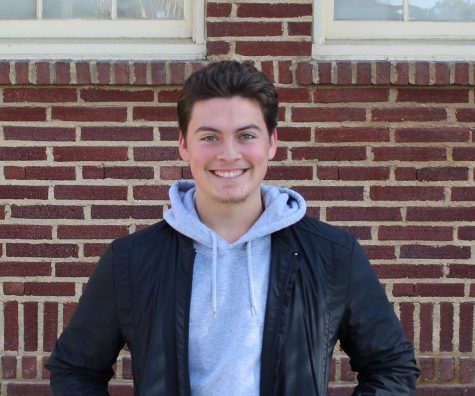
Patrick Henslee is in his third semester at the Rampage, and steps into the role of Managing Editor for the Spring 2020 semester. The 20-year-old is an...

